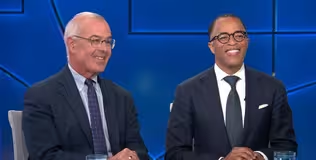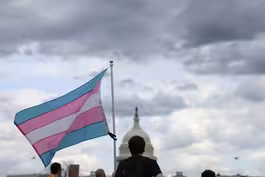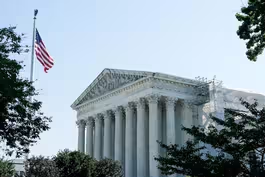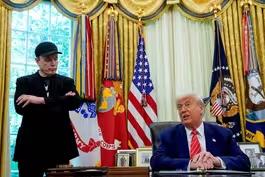
Jacinda Ardern on keeping hope and empathy in politics
Clip: 6/6/2025 | 9m 3sVideo has Closed Captions
Jacinda Ardern on keeping empathy in politics and new memoir, 'A Different Kind of Power'
At 37 years old, Jacinda Ardern was the world’s youngest female head of government when she became prime minister of New Zealand. She was also just the second to give birth while in office and led her nation through crises, including a devastating mass shooting and the pandemic. Ardern joined Amna Nawaz to discuss her memoir, “A Different Kind of Power," and the documentary, “Prime Minister.”
Problems playing video? | Closed Captioning Feedback
Problems playing video? | Closed Captioning Feedback
Major corporate funding for the PBS News Hour is provided by BDO, BNSF, Consumer Cellular, American Cruise Lines, and Raymond James. Funding for the PBS NewsHour Weekend is provided by...

Jacinda Ardern on keeping hope and empathy in politics
Clip: 6/6/2025 | 9m 3sVideo has Closed Captions
At 37 years old, Jacinda Ardern was the world’s youngest female head of government when she became prime minister of New Zealand. She was also just the second to give birth while in office and led her nation through crises, including a devastating mass shooting and the pandemic. Ardern joined Amna Nawaz to discuss her memoir, “A Different Kind of Power," and the documentary, “Prime Minister.”
Problems playing video? | Closed Captioning Feedback
How to Watch PBS News Hour
PBS News Hour is available to stream on pbs.org and the free PBS App, available on iPhone, Apple TV, Android TV, Android smartphones, Amazon Fire TV, Amazon Fire Tablet, Roku, Samsung Smart TV, and Vizio.
Providing Support for PBS.org
Learn Moreabout PBS online sponsorshipAMNA NAWAZ: At 37 years old, Jacinda Ardern was the world's youngest female head of government when she became prime minister of New Zealand.
She was also just the second in history to give birth while in office.
And she led her nation of five million through multiple crises, including a devastating mass shooting and the COVID pandemic, before resigning in 2023.
Her historic journey is the focus of a new documentary called "Prime Minister" set to premiere next week.
And I spoke with her recently about her time in office and her new memoir, "A Different Kind of Power.
Prime Minister Ardern, welcome to the "News Hour."
Thank you for being here.
JACINDA ARDERN, Former Prime Minister of New Zealand: Thank you for having me.
AMNA NAWAZ: So, in the book, in the very first page, you dedicate it to the criers, the warriors, and the huggers, which just hit me right in the heart.
(LAUGHTER) AMNA NAWAZ: But the words that you use to describe power are not words we usually hear from heads of state.
You talk about empathy and kindness.
You write about preparing to become prime minister and wanting to bring kindness back.
How and why did those become your guiding principles?
JACINDA ARDERN: Well, in part because I think those are all of the things that took me into politics in the first place.
And I think, unfortunately, over time, and this is something that I notice is a bit of a universal thing, we have built up an expectation about the way that politicians need to behave in order to survive the political environment.
But I don't believe that necessarily means that is what people are expecting of us, that idea that you have to be devoid of kindness because that would equate to weakness, or the idea that it's a compassion-free zone.
I actually do think voters seek that.
And, hopefully, my time in politics demonstrated that you can lead in that way and you can successfully lead in that way.
AMNA NAWAZ: You write in the book about very suddenly someone unexpectedly being thrust into leadership.
And you write very honestly about I think what's fair to call the impostor syndrome of it all.
JACINDA ARDERN: Yes.
AMNA NAWAZ: You wrote in the book: "I had been deputy leader for exactly five months.
Now I was running to be the prime minister of New Zealand.
There were moments where I hovered above myself, just an observer to these high-speed events.
It all felt so surreal."
So how do you get over that sense of, how did I get here and can I do this?
JACINDA ARDERN: Responsibility.
There is nothing I think that will overshadow any self-doubt more than a sense of responsibility.
And I did question at times whether I was the right person to be seven weeks out from an election suddenly at 37 years of age, being thrust into the position of running to be prime minister of New Zealand.
But I think the message that I would like to share is, even if you have that confidence gap, first of all, you are able to overcome it when what becomes bigger in your mind is your sense of responsibility and your duty to others, but, equally, that confidence gap can actually bring some strength as well.
It often means you bring humility to leadership.
It means that you prepare.
It often means you look for risk and that you bring in experts and others who can help inform your decision-making.
Those are good leadership qualities that we too often discount.
AMNA NAWAZ: You write about how you wanted to bring people into the experience of leadership, especially leading in crisis.
And you had to do that, as you mentioned, when there was a white supremacist mass shooting at two mosques in New Zealand, killed 51 people in 2019.
And we should remind people gun ownership in New Zealand is relatively high, right?
JACINDA ARDERN: It is.
AMNA NAWAZ: Guns, in this case, in that shooting, had been legally acquired.
You said never again.
AMNA NAWAZ: You pushed for change.
And you do it.
You ban military-style semiautomatic weapons.
You limit high-capacity magazines, establish a firearms registry, all within just over a year.
AMNA NAWAZ: And I know that you're hesitant to weigh into other nations' politics, especially here in the U.S., but you live here now.
You know both these countries.
So I wonder what you think the difference is between the two nations that kept similar changes from being enforced here.
JACINDA ARDERN: And, look, I comment as an observer and also acknowledging the significant differences in our political systems.
Yes, we changed our gun laws and the ban on military-style semiautomatic weapons after that horrific event in New Zealand.
Those laws changed within 27 days.
But that was also because we had the support of members of Parliament.
We have 120 of them, and 119 voted in favor of their change.
And I think it's because they felt the weight of expectation from the New Zealand public, because an empathetic response is nothing if it's not coupled with action that doesn't drive change.
And my observation, of course, is that our systems are different, but also in New Zealand we do see gun ownership as very much a responsibility versus a right.
But I, having said that, still observe an expectation as well here.
AMNA NAWAZ: Among the general public?
JACINDA ARDERN: Yes, among the general public.
I do sense that.
I think merely the fact that I'm asked so frequently about that change in New Zealand, that I'm asked to make an observation here, that tells me that crisis is still calling for change.
It just has not yet been answered yet.
AMNA NAWAZ: Do you feel lawmakers here have failed to meet the expectations then?
JACINDA ARDERN: Again, this is where I just, again, as an outside observer -- only lawmakers could speak to the circumstances that are leading to the status quo.
My observation, though, is that, the public, is that the expectation for change is still present.
AMNA NAWAZ: You write very personally in the book too about all the questions that you, as a woman, as a woman in her mid-30s, as a woman who talked about wanting a family, faced all along your political career as you rose into power, whether or not you were planning on getting pregnant, whether or not you would take maternity leave if elected.
One interviewer asking about, shouldn't employers know who they're hiring?
That's the moment you write about on a TV show in which you kind of snap.
JACINDA ARDERN: Yes.
(LAUGHTER) AMNA NAWAZ: And you point to him and you say: "It is totally unacceptable in 2017," when this interview was, "to say that a woman should have to answer that question in a workplace."
You repeated: "It is unacceptable."
AMNA NAWAZ: Tell me about that moment.
What happened?
JACINDA ARDERN: Yes, there had been a bit of -- I mean, there had been some -- as you say, some context to that, some buildup.
I had perhaps climatized to the idea that it was something that for me was not going to be personal.
And, in part, I accepted that.
I lived a -- I was in public life.
I was in a role where I was asking for people to support me.
So I guess in a way I put myself in a different category when it came to questions around having a family.
So I was used to the speculation, and I was happy to answer that question, but I completely rebelled against the idea that every woman should have to answer that question.
And so that was a moment where I pushed back hard, not for me, but I hoped, in that moment, for others.
AMNA NAWAZ: You have become very familiar with this country in a bit more ways.
In the headlines today is this very public, very personal back-and-forth between two of the most powerful men on the planet, President Trump and Elon Musk.
And I just wonder, as you watch this unfold in the way that it is, very shoot from the hip, very emotional, what do you make of that?
How are you watching that?
JACINDA ARDERN: Yes, I mean, one of the things that I hope to do by putting out a book that I never really intended to write was to spotlight different types of leadership, because, actually, regardless of whether you start a conversation about politics in the U.S. or in parts of Europe, we are in a moment where a particular style of leadership is being spotlighted.
But it's not the only one.
I lead a fellowship on empathetic leadership with politicians who are out there in the field now often in senior positions who are leading in a very particular way, but that often doesn't attract headlines.
So I will use whatever opportunity I have to put the spotlight on them instead.
AMNA NAWAZ: Could you ever see two women having this kind of public back-and-forth in leadership positions?
Is there a double standard still at play?
JACINDA ARDERN: Maybe we put a few more women in leadership, and then we can ask ourselves the question.
(LAUGHTER) AMNA NAWAZ: Do you think the U.S. will have a woman president in our lifetime?
JACINDA ARDERN: In my lifetime, I do believe.
Yes, I do.
I do.
AMNA NAWAZ: Why do you think that?
JACINDA ARDERN: And I don't think I'm particularly engaging in anything that would give me any outstanding longevity.
So why do I think that?
I think all Western liberal democracies are designed to represent the communities they serve.
And I'm very lucky.
In New Zealand, the first country in the world to give women the right to vote, I was the third female prime minister.
There does come a point where gender doesn't become an issue anymore and it just becomes about good leadership.
AMNA NAWAZ: The book is "A Different Kind of Power."
The author is the Right Honorable Dame and former Prime Minister of New Zealand Jacinda Ardern.
Prime Minister, thank you so much for your time.
JACINDA ARDERN: Thank you.
Brooks and Capehart on the Democrats' big problem
Video has Closed Captions
Clip: 6/6/2025 | 9m 18s | Brooks and Capehart on the Democrats' big problem (9m 18s)
Facing Trump ban, trans troops reflect on military service
Video has Closed Captions
Clip: 6/6/2025 | 9m 33s | 'We have earned our spots': Facing Trump ban, trans troops reflect on military service (9m 33s)
Kilmar Abrego Garcia returned to U.S. to face charges
Video has Closed Captions
Clip: 6/6/2025 | 4m 10s | Kilmar Abrego Garcia returned to U.S. to face charges from Tennessee traffic stop (4m 10s)
News Wrap: DOGE allowed access to Social Security systems
Video has Closed Captions
Clip: 6/6/2025 | 5m 53s | News Wrap: Supreme Court allows DOGE to access Social Security systems (5m 53s)
The potential fallout from the Trump-Musk feud
Video has Closed Captions
Clip: 6/6/2025 | 6m 29s | The potential fallout for the country as Trump and Musk escalate public feud (6m 29s)
Providing Support for PBS.org
Learn Moreabout PBS online sponsorshipSupport for PBS provided by:
Major corporate funding for the PBS News Hour is provided by BDO, BNSF, Consumer Cellular, American Cruise Lines, and Raymond James. Funding for the PBS NewsHour Weekend is provided by...
















